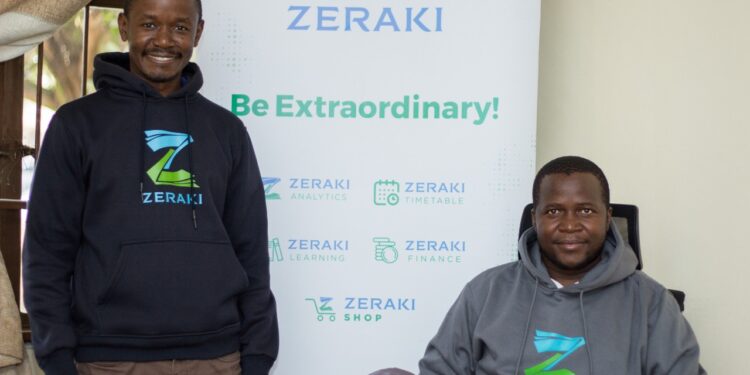Zeraki, a Kenyan edtech company that developed digital learning and school data analytics platforms, has raised $1.8 million in seed funding led by Acumen Fund for product catalogue expansion and regional expansion.
The Nairobi Business Angels Network (NaiBAN) and Melvyn Lubega, co-founder of Go1, an Australia-based edtech unicorn, all participated in the round, as did Save the Children Impact Investment Fund, Verdant Frontiers Fintech, and Logos Ventures.
The edtech co-founder and CEO Isaac Nyangolo mentioned that the company plans to introduce more administrative tools for schools, such as timetabling software, as well as help parents with fee loans.
We’ve built an extensive distribution channel covering almost half of the high schools in Kenya, and that means we have an opportunity to solve other tech needs that schools have.
Zeraki co-founder & CEO Isaac Nyangolo“We plan on building more administrative tools for schools, and payment products on the parents’ side. We have also brought back focus on [the once dormant] digital learning platform, and also tested a number of products like timetabling,” he added.
The company also plans to expand into ten new markets over the next three years after establishing itself in Kenya, Uganda, and Guinea.
“We’re expanding first into the regions that we understand and have similar business environments. We plan on first moving into the entire East Africa community and then exploring the Anglophone region,” said Nyangolo.
The edtech company, co-founded in 2014 by Nyangolo and Erick Oude (COO), initially introduced an interactive digital learning platform for high school students, which included quizzes and systems for tracking their performance, but it wasn’t popular until the COVID pandemic struck in 2020.
The edtech company then set about developing a data analytics system to assist schools in better managing their students’ data. Teachers can upload students’ grades from their mobile phones to the data analytics platform, which provides a performance breakdown for each student, subject, or stream.
The platform, which is more popular than digital learning platforms, also includes a bulk messaging service for internal and external communication and a way for parents to track student performance and pay fees.
“Every child needs a report card at the end of the school term. And the platforms for producing these report forms were offline computer-based platforms. So, teachers had to line up behind two or three computers at a school to do the data entry in order to produce the report forms. By moving this to a mobile-first cloud-based experience, it means that as soon as they are done grading students’ grades at home, the teachers just enter the scores on their phone,” Nyangolo said.
So far, more than 5,000 schools with a total of 2 million students have used the data analytics platform, according to Nyangolo. He anticipates that demand will continue to rise as they expand into new markets and more schools adopt digital tools to streamline administrative tasks.
“Education is yet to be digitalized across most countries in Africa, and there is greater opportunity for us to build this market. Laying that foundation that introduces countries, schools and parents on how technology can solve the problems we have in education and being one of the companies in Africa that have shown that it is possible to do this at scale makes this an exciting opportunity,” he said.
Read Also: Kenyan Edtech Startup Kidato raises US$1.4Million Seed for Online Classes




